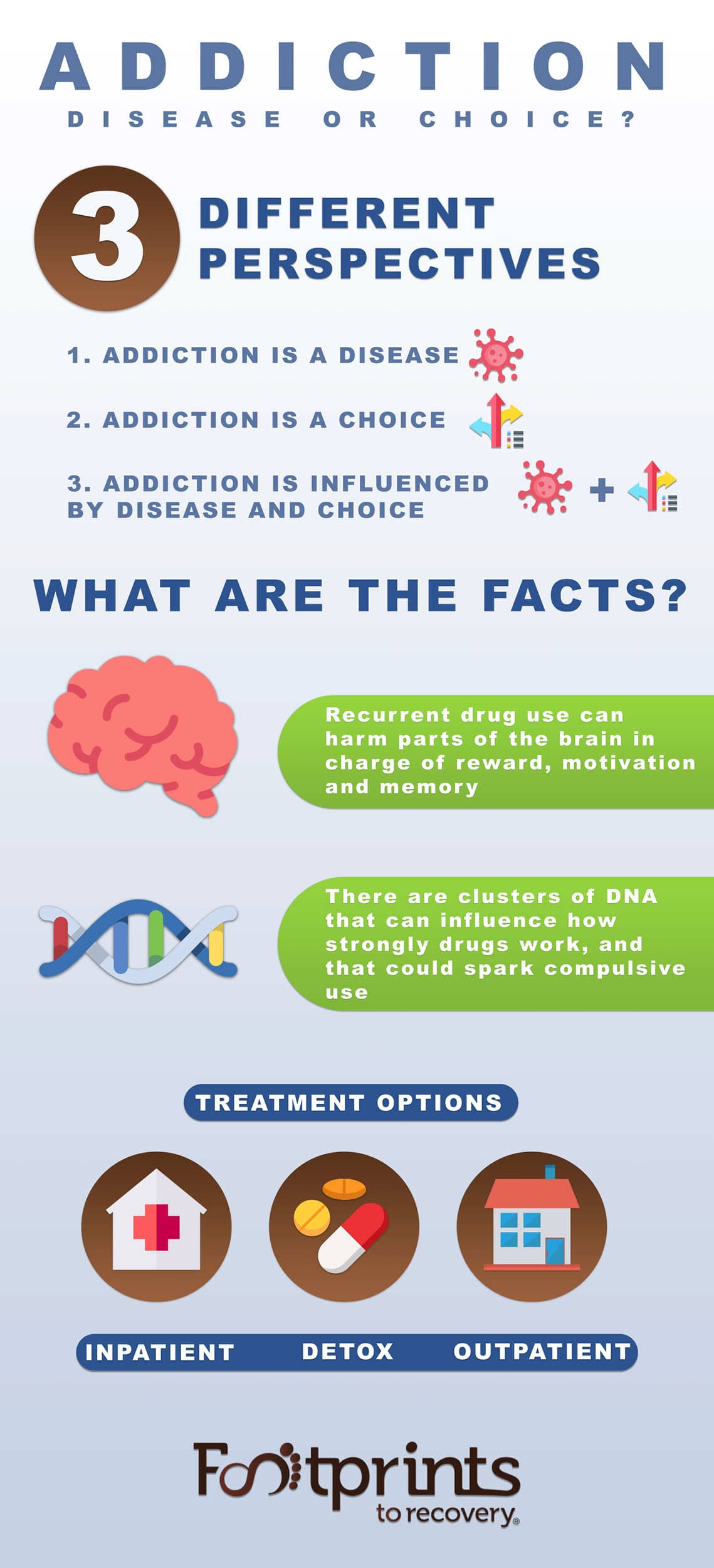Skip To Section
It’s an argument being debated within the medical and neuroscience industries. There are three main camps including:
- Addiction is a disease. People in this group point to brain changes caused by addiction that hinder free will. They also cite studies of the genetics of addiction.
- Addiction is a choice. Those in this group say addictions stem from behaviors, not disease processes. They also say addictions don’t always require treatment for recovery to begin.
- Addiction is influenced by disease and choice. Organizations that fall in the middle suggest that addictions do have a brain and chemical component, but that they’re reinforced by societal problems, like poverty.
The majority of people with an addiction, choose to start drug use. But when the habit grows and strengthens, does the element of choice remain, or does the use stem from a disease? It’s understandable how someone may ask if addiction is really a disease or a choice.
Let’s dig deeper into each argument, so you can form a deeper understanding of what might influence your recovery.

Yes: Addiction Changes Brain Chemistry
We all believe in free will. But we use our brain cells to make decisions, and damage to crucial parts of the brain can cloud our thinking and push us toward decisions we wouldn’t otherwise make.
The American Society of Addiction Medicine says that recurrent drug use can harm portions of the brain in charge of:
- REWARD
- MOTIVATION
- MEMORY
These parts of your brain highlight moments that feel good, and they can prompt repeated behavior. When the brain is damaged, people experience an inability to control their impulses, make good decisions, and move forward despite the knowledge of drug’s damaging impact.
It’s the damage, experts say, that keeps people using even when they don’t want to do so. Since behaviors are sparked by cell damage, addiction can and should be defined as a disease of brain chemistry.

Yes: Relapse Rates Are Similar to Other Diseases
Most diseases come with a self-care component. You must make changes in your habits to ease your symptoms, and if you don’t, the disease worsens. When you step away from these shifts, it’s known as a relapse. These are common among all chronic conditions, and it’s an attribute that suggests addiction is a disease.
The National Institute on Drug Abuse (NIDA) says relapse rates for addiction are similar to those seen in diabetes, asthma, and hypertension. Just as we don’t blame people with diabetes for stepping away from their plans on occasion, we shouldn’t blame people with addictions for falling back into their habits. They don’t make a choice. It’s a side effect of a long-standing disease process.
If addiction wasn’t a disease, one could argue, people wouldn’t relapse so frequently. They would choose to stop and make it stick. Since they don’t, the disease is at play.
Yes: There Is a Genetic Component
NIDA says about half of addiction risk resides in the genes. This has been proven with twins studies. While the exact “addiction gene” hasn’t yet been found, researchers have identified clusters of DNA that can influence how strongly drugs work, and that could spark compulsive use.
Genes aren’t destiny. But they can deeply influence choices.
Genes also play a role in plenty of other diseases, including the following:
- Cancer
- Schizophrenia
- Cystic fibrosis
- Sickle cell anemia
- Down’s syndrome
If we can lay blame for these diseases at the feet of genes, we should be able to do the same for addictions, some experts say.
No: Addiction Stems From Behaviors
Some diseases are easy to see with a lab test. When we see a lump in a mammogram, a needle aspirate could confirm cancer or suggest the bump is benign. There is no such test for addiction, people in this camp say. Addiction is defined by what people do, not how they change. And that makes the condition a choice.
Analysts who fall into this camp say that addictions don’t stem from:
- Infections, as we might see with Lyme disease.
- Biologic degeneration, as we might see with Alzheimer’s disease.
- Pathologic biology, as we might see in diabetes.
Instead, addictions are defined by the bad choices people make daily. If they made different choices, they say, the disease will disappear. And all lab tests would remain the same.
No: Recovery Comes Down To Choice
Most diseases are attached to accepted treatment protocols. When you’re diagnosed, your doctor knows where to start to help you get better. Addictions are more complex, and some people who choose to recover see significant results without much treatment at all. For the people who say addiction is a choice, they believe recovery is, by extension, a choice.
Those who believe in this concept say that treatment for addiction often means little more than convincing people to stop doing something. If a person with an addiction is kept away from that drug (by jail, for example), the condition will magically disappear. This is a blatantly false belief that has been proven wrong in research and real-life situations time and time again.
If someone were to develop cancer due to radiation exposure, simply removing them from the source of radiation isn’t enough. While it may stop them from being poisoned further, it does not address the damage that has already been done. Keeping them from cancer treatment would only allow the disease to worsen inside of them. The same is true for addiction. Unless the person is remove from the toxin and treated for the underlying disease, they while simply get worse as time passes. This is because addiction is a progressive disease.
Recovery About Opportunity
For some addiction experts, the question is nuanced. They know that addictions can change behavior and make good decision-making tough. But they say that the environment in which addiction blossomed can help or harm recovery.
For example, substance abuse is often tied to:
- Unemployment: Habitual drug use clouds thinking and takes time to maintain. That can leave little leftover for work.
- Poverty: Selling and using drugs represents a livelihood for some families. When addictions begin, it’s easy to use up the entire stock.
- Violence: Getting drugs means walking into dicey neighborhoods. And some drugs are so expensive that people steal to get them.
To address addictions, these experts say, we must ensure that people have opportunities, jobs, and stable communities. When that happens, drug use won’t seem like a necessary escape from a difficult life.
Where Do You Stand?
Do you think addiction is a disease? Or do you think it’s about choices? Or does it matter to you? Researchers, pundits, and other experts can argue about how addictions develop all day long. But if you’re living with an addiction, this can be little more than background noise to you.
Addictions feel urgent, and you do need quick care. When you stop, your brain cells can heal, you can make better habits, and you can improve your life. That’s true whether an addiction is a choice or a disease.
The truth is that many components and factors play a role in addiction. You can choose whichever camp makes the most sense to you. The priority is not the stance you take, but the action you put forward to change your current situation.
"*" indicates required fields
Fill out the form below and one of our admissions team members will reach out to you:
"*" indicates required fields

Recovering from Addiction Whether it’s a Choice or a Disease
Whether you see addiction as being a choice, disease, or both, it’s crucial to address the problem at hand nonetheless. There are actionable steps a recovering individual can take to conquer addiction and find fulfillment in a long-lasting sober life.
Deciding to seek help is the first step. Sit down and be honest with yourself. Ask yourself: “Am I happy with where I am today?” “Am I in the driver’s seat or is addiction controlling my life?” If it’s clear that it’s time to get help, then it’s time to look at your many options.
Addiction Treatment Programs
An essential aspect of addiction treatment is treatment length. It is crucial to continue with a treatment program long enough to emerge with confidence regarding your newly learned skills and tools for long-term sobriety. Depending on the treatment program, the exact components of treatment will vary.
Addiction treatment programs include:
- Medical detox programs
- Inpatient programs
- Partial hospitalization programs
- Intensive outpatient programs
- Outpatient programs
Detox
Detox is the first step in the recovery process for addiction. It is a crucial and necessary step in order to begin the healing journey towards sobriety.
Detox, short for detoxification, refers to the process of removing harmful substances from the body. In terms of addiction, this means ridding the body of any drugs or alcohol that have been regularly consumed. This can be a physically and mentally challenging process, as withdrawal symptoms may occur as the body adjusts to functioning without these substances.
The goal of a medical detox program is not only to remove toxins from the body, but also to prepare individuals for further treatment. It helps to stabilize their physical and mental state so they can focus on addressing their addiction in therapy and other forms of treatment.
Inpatient Rehabilitation
Residential treatment generally takes courses over a 30-, 60- and 90-day period. Residential treatment, also referred to as inpatient rehabilitation, requires the member to live at our recovery center. This is the highest level of care offered. There will be ongoing medical support and psychological care 24/7.
In residential treatment, each day is structured with a healthy routine and multiple evidence-based therapies, along with medical support. The first step of inpatient rehabilitation is generally the detox process. This is the first stage of the recovery process.
Detoxification is the process your body goes through to get rid of harmful chemicals that were built up over time. In other words, you get to work with a cleaner slate at the beginning of treatment. Afterward, treatment will take place and you’ll have a structured daily schedule of therapies that will teach to maintain long-term sobriety.
Partial Hospitalization Programs (PHPs)
Partial hospitalization programs are classified as a form of outpatient treatment. These programs offer high-quality treatment similar to a residential treatment program, including access to mental health care services, if needed. The main difference is that PHPs do not require the recovering individual to reside at the facility.
The American Society of Addiction Medicine (ASAM) recommends that PHPs provide 20 hours of programming per week, while intensive outpatient treatment programs provide 9 hours per week. Another key difference between a PHP and an intensive outpatient program (IOP) is the amount of time the person spends in the program. The American Society of Addiction Medicine (ASAM) also suggests that PHPs provide 20 hours of programming per week, while IOPs provide 9 hours per week.
Some of the services that partial hospitalization programs may include are:
- One-on-one therapy
- Group therapy
- Family meetings
- Medical support
- Treatment of co-occurring mental health disorders
- Employment and educational assistance
Intensive Outpatient Programs (IOPs)
Intensive outpatient programs (IOPs) are classified as a form of outpatient treatment. These programs offer high-quality treatment options for individuals struggling with substance abuse or addiction. IOPs are designed to provide structured care and support for those who may not require the intensity of a residential program, but still need more intensive treatment than traditional outpatient programs can offer.
IOPs typically consist of group therapy sessions, individual counseling, and other therapeutic activities such as art therapy or yoga. These programs also often incorporate elements of 12-step programs or other evidence-based practices in order to help clients achieve long-term recovery.
One of the main benefits of an intensive outpatient program is the flexibility it offers. Unlike residential treatment, which requires clients to live at the facility for a set period of time, IOPs allow individuals to continue living at home and attending work or school while receiving treatment. This can be particularly beneficial for those who have family or work obligations that they cannot leave for an extended period of time.
Outpatient Rehabilitation
Whether addiction is a choice or a disease, the need for treatment remains the same. If inpatient rehabilitation is too intensive of an option, then, fortunately, other levels of care may suit you better. Outpatient rehabilitation is ideal for recovering individuals with serious obligations outside of treatment.
For example, you may have a child to take care of at home and are unable to find a babysitter. In other cases, you may be a student who takes classes multiple times a week. No matter the situation, outpatient treatment creates a schedule that works for the recovering individual. Residing at the facility is not a requirement.
Intensive outpatient programs are a more intensive level of care as compared to standard outpatient treatment. Both types of treatment will call for scheduled sessions at the facility weekly. However, the amount of time dedicated to each outpatient treatment program will vary.
Outpatient treatment is a great option for individuals with a strong, stable support system at home. This allows them to meet with addiction treatment specialists during the day and learn about healthy coping mechanisms and sobriety. These recovering individuals can then apply what they’ve learned to everyday situations when they return home.
Addiction Treatment Services
During addiction treatment, you gain access to a variety of services all aimed at helping you heal. Some common addiction treatment services include:
- Didactic Lectures
- Mutual Self-Help Programming
- Skills Training
- Expressive Therapy (Yoga, Tai chi, Art, Music, Comedy)
- Community Support
- Nutritional Counseling, and other Wellness Initiates
- Individual therapy
- Group therapy
- Family therapy
- Case management
- Aftercare programs
We encourage you to give us a call to find out more information regarding what the different types of programs entail. However, the majority of our treatment programs will include evidence-based and holistic services to help heal your mind, body, and spirit in recovery.
Seek Help with Footprints Recovery and Begin to Change Your Life Today
At Footprints to Recovery, we believe in high quality and personalized treatment for each recovering individual. Our dedicated addiction specialists will support you from the moment you walk through our doors through aftercare planning. No matter what you’re going through, there is potential for a better tomorrow.
If you have any questions, comments, or concerns, don’t hesitate to give us a call. See if there is a Footprints to Recovery location near you and contact the one closest to you. We’re waiting for your call!
- Addiction Is Not a Brain Disease – PSMag
- Addiction is not a disease – PMC
- Prevention | National Institute on Drug Abuse (NIDA)
- Principles of Drug Addiction Treatment: A Research-Based Guide (Third Edition)
- What is the Definition of Addiction?
- Overview of Substance Use Disorder Care Clinical Guidelines: A Resource for States Developing an 1115 SUD Demonstration
Our admissions team is available 24/7 to listen to your story and help you get started with the next steps.








